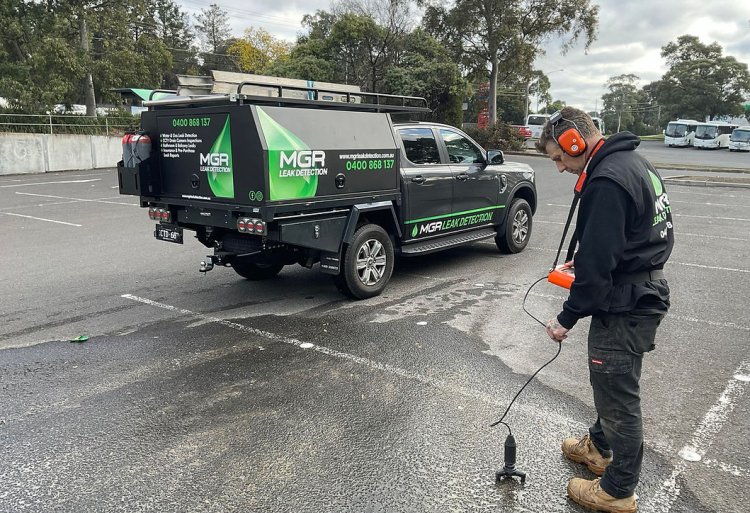How to Identify Leaks in Slab? Saving Your Melbourne Home From Costly Damage
A slab leak, occurring in the water pipes beneath your home's concrete foundation, can be a silent but destructive problem. If left undetected, it can lead to significant structural damage, mould growth, and escalating water bills.

A slab leak, occurring in the water pipes beneath your home's concrete foundation, can be a silent but destructive problem. If left undetected, it can lead to significant structural damage, mould growth, and escalating water bills. For Melbourne homeowners, knowing how to identify a slab leak early is crucial for preventing costly repairs. This article explores the signs of a slab leak and the methods used to detect them, emphasizing the importance of professional assistance.
What is a Slab Leak?
A slab leak is a water leak that occurs in the pipes located beneath the concrete slab foundation of your home. These pipes, usually made of copper or PVC, can corrode, crack, or break due to various factors, including:
-
Soil Shifting: Movement of the ground beneath your home can put stress on pipes.
-
Corrosion: Chemical reactions in the water or soil can corrode pipes over time.
-
Poor Installation: Poorly installed pipes are more prone to leaks.
-
High Water Pressure: Excessive water pressure can weaken pipes and cause them to burst.
Telltale Signs of a Slab Leak
Identifying a slab leak early can save you from extensive damage and costly repairs. Here are some common signs to watch for:
-
Unexplained Increase in Water Bill: A sudden and inexplicable spike in your water bill is often the first indication of a hidden leak.
-
Sound of Running Water: Hearing the sound of running water when all taps and appliances are turned off can suggest a leak beneath your slab.
-
Damp or Warm Spots on Flooring: Moisture or warm areas on your floors, especially in bathrooms or kitchens, may indicate a leaking hot water pipe.
-
Low Water Pressure: Reduced water pressure in your home can be a sign of a leak in the main water line.
-
Mould or Mildew Growth: Unexplained mould or mildew growth on walls or floors can occur due to increased moisture from a slab leak.
-
Cracks in Walls or Floors: Movementin Foundation caused by a slab leak can cause cracks in walls or floors.
-
Musty Odours: A persistent musty or earthy odour in your home may indicate hidden moisture from a leak.
-
Movement in House: In severe circumstances the house can begin to shift as the slab loses integrity.
Methods for Slab Leak Detection
If you find a slab leak, it’s essential to employ accurate detection methods to pinpoint the source of the problem:
-
Pressure Testing:
-
This involves isolating sections of your plumbing system and testing the pressure. A drop in pressure indicates a leak in that section.
-
Acoustic Listening Devices:
-
Technicians use sensitive microphones to listen for the sound of running water beneath the slab. This method can help identify the approximate location of the leak.
-
Thermal Imaging:
-
Thermal imaging cameras detect temperature variations caused by moisture. These cameras can identify warm or cold spots on your floors, indicating a leak.
-
Tracer Gas:
-
A harmless tracer gas is injected into the plumbing system, and a gas detector is used to identify the point where the gas is escaping, pinpointing the leak location.
-
CCTV Drain Cameras:
-
Small cameras on flexible cables are inserted into pipes to visually inspect for cracks, breaks, or other issues.
The Importance of Professional Slab Leak Detection
While some homeowners might attempt DIY leak detection, professional services offer several advantages:
-
Expertise and Experience: Professionals have the training and experience to accurately diagnose and locate slab leaks.
-
Advanced Technology: Professionals use specialized equipment that is not readily available to the average homeowner.
-
Minimised Damage: Professionals use non-invasive techniques to minimize damage to your property during leak detection.
-
Accurate Repairs: Professionals can provide targeted repairs based on the precise location and cause of the leak.
Steps to Take if You Suspect a Slab Leak
-
Turn Off Water Supply: If you suspect a slab leak, turn off the main water supply to your home to prevent further damage.
-
Contact a Professional: Call a licensed plumber or leak detection specialist to assess the situation.
-
Provide Information: Provide the technician with as much information as possible about the signs you’ve noticed, such as increased water bills or damp spots.
-
Follow Recommendations: Follow the technician’s recommendations for leak detection and repairs.
Preventing Slab Leaks
While you can’t entirely prevent slab leaks, there are steps you can take to reduce the risk:
-
Regular Plumbing Inspections: Have your plumbing system inspected regularly to identify potential problems early.
-
Water Pressure Management: Ensure that your water pressure is within the recommended range to prevent stress on pipes.
-
Proper Drainage: Maintain proper drainage around your home to prevent water from accumulating near the foundation.
-
Quality Materials: Use high-quality pipes and fittings when constructing or renovating your home.
Conclusion: Protect Your Home with Expert Slab Leak Detection
Protecting your Melbourne home from the dangers of slab leaks requires vigilance and prompt action. By understanding the signs of a slab leak and employing accurate detection methods, you can prevent costly damage and ensure the safety of your property.
When you need reliable and professional Slab Leak Detection services, trust MGR Leak Detection to provide exceptional solutions tailored to your needs. With their expertise in using state-of-the-art technology and commitment to customer satisfaction, MGR Leak Detection ensures that property is protected from the hidden dangers of slab leaks. Contact MGR Leak Detection today and experience the peace of mind that comes with knowing your home is in expert hands!
What's Your Reaction?














.jpg)
.jpg)

